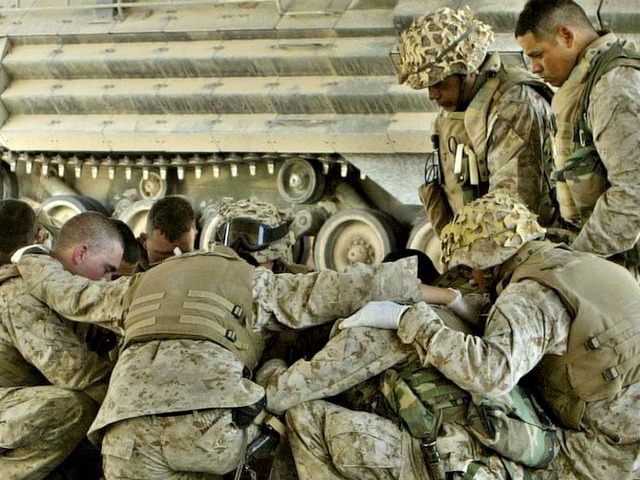HISTORIAN: ‘AMERICA NO LONGER ABLE TO WIN WARS’
HISTORIAN: ‘AMERICA NO LONGER ABLE TO WIN WARS’

by ROBERT WILDE23 May 2015290
Author Patrick K. O’Donnell joined Breitbart News Saturday as a guest on the program’s Memorial Day weekend special.
O’Donnell is a combat historian and has written 10 books on American history beginning with the American revolution and ending with modern war and the Battle of Fallujah. O’Donnell explained that he volunteered to go to Iraq as an embed, even though he didn’t have any book deals on the table when he departed to the war torn country.
During the Iraq war, O’Donnell was embedded with military units as the only civilian combat historian and spent three months in Iraq documenting the experiences of troops in battle. O’Donnell went door-to-door with other Marines and was witness to intense urban warfare.
On his second tour in Iraq, O’Donnell served as a war correspondent for Men’s Journaland Fox News, reporting on the conflict in Iraq from the perspective of the Marines on the ground.
“It is still a very painful topic for me, still to this day,” he told the co-hosts of BNS,Breitbart News executive chairman Stephen K Bannon and editor-in-chief Alexander Marlow. Just talking about his experience of being with the soldiers in Fallujah elicited a deep emotional response inside of the acclaimed jounalist.
“I was ambushed by Chechens on one occasion. I pulled out a marine who was mortally wounded, who was shot in the head from a firefight that we were in,” he recounted.
For the past 10 years, O’Donnell stayed in touch with all the veterans and explained that the “pain that many of them have gone through has been tremendous.”
After the war there were two suicides in the platoon in which he was embedded, and many of the men have been racked with PTSD.
Bannon brought up the point that he’d spoken to many World War II veterans who can’t believe the stuff that these millennial soldiers fighting in Fallujah had to go through. “They are doing things that WW II vets didn’t have to do, putting up with the psychological pressure. In those days we hit the beach and clear cut everything in front of us,” they told Bannon. “If it moved, it was gone. There was no worrying about rules of engagement. There was none of this protecting civilians. It it was just a free fire zone, all of it.”
The point that the vets kept making, Bannon told Breitbart News Saturday listeners, was that in urban combat like Fallujah, the psychological pressure put on you, particularly for junior enlisted people, is tremendous.
O’Donnell said that the “rules of engagement were very interesting in Fallujah and it cost a lot of people their lives.”
The combat historian said that the soldiers in Fallujah were given orders that they could not clear houses with anything other than their M-16s and grenades. “And that was a disaster,” he said. “The insurgents, which included many international terrorists and foreign fighters from 17 different countries, were in bunkered positions much like the Pacific war and they fought to the death.”
O’Donnell went on to explain that most of the Marines that were killed were shot in the head. The only way the enemy could kill Americans was to shoot at the head or at the side where the body armor had gaps.
Marlow asked O’Donnell, given that the Iraq war has been so unpopular, particularly on the left, but also for libertarians and even some conservatives, “What is it like for these troops in combat, knowing that any sort of mistake can become the lead story on the Huffington Post, national humiliation, or even result in a show trial? Does it affect the way we are fighting?”
O’Donnell said that he thinks it does have an effect. “The way that we fight wars needs to be retooled. We are not able to win wars,” he asserted. “There are major handicaps across the board, based on the way we conduct and fight wars.”
The author of We Were One, the story of the Marines who took Fallujah, said that the rules of engagement are problematic, because there’s not enough troops in many cases, and the objectives are changing constantly.
He continued, explaining that morale problems are prominent because even the tiniest mistake can lead to their dismissal. “The pressure that they’re under is tremendous.”
Bannon added, “Not just dismissal, but could lead to prison time or lawsuits.” O’Donnell said that the Marines were put in an impossible situation when they were asked to clear houses using M-16s and grenades.
“When you’re facing a bunkered enemy like Chechens, fighters that know how to fight, you need all the weapons you could have. You need tank support, you need bulldozers, you need Bradley fighting vehicles with their 30 mms, and you need torpedoes,” he insisted.
“The situation in Fallujah was an intelligence failure. They said there were thousands of civilians in Fallujah when in fact it was cleared. The only people there were insurgents and international terrorists that were there just to kill Americans. You’re in the situation where you’re trying to clear houses, worried about civilians, so the enemy has a complete advantage.”

